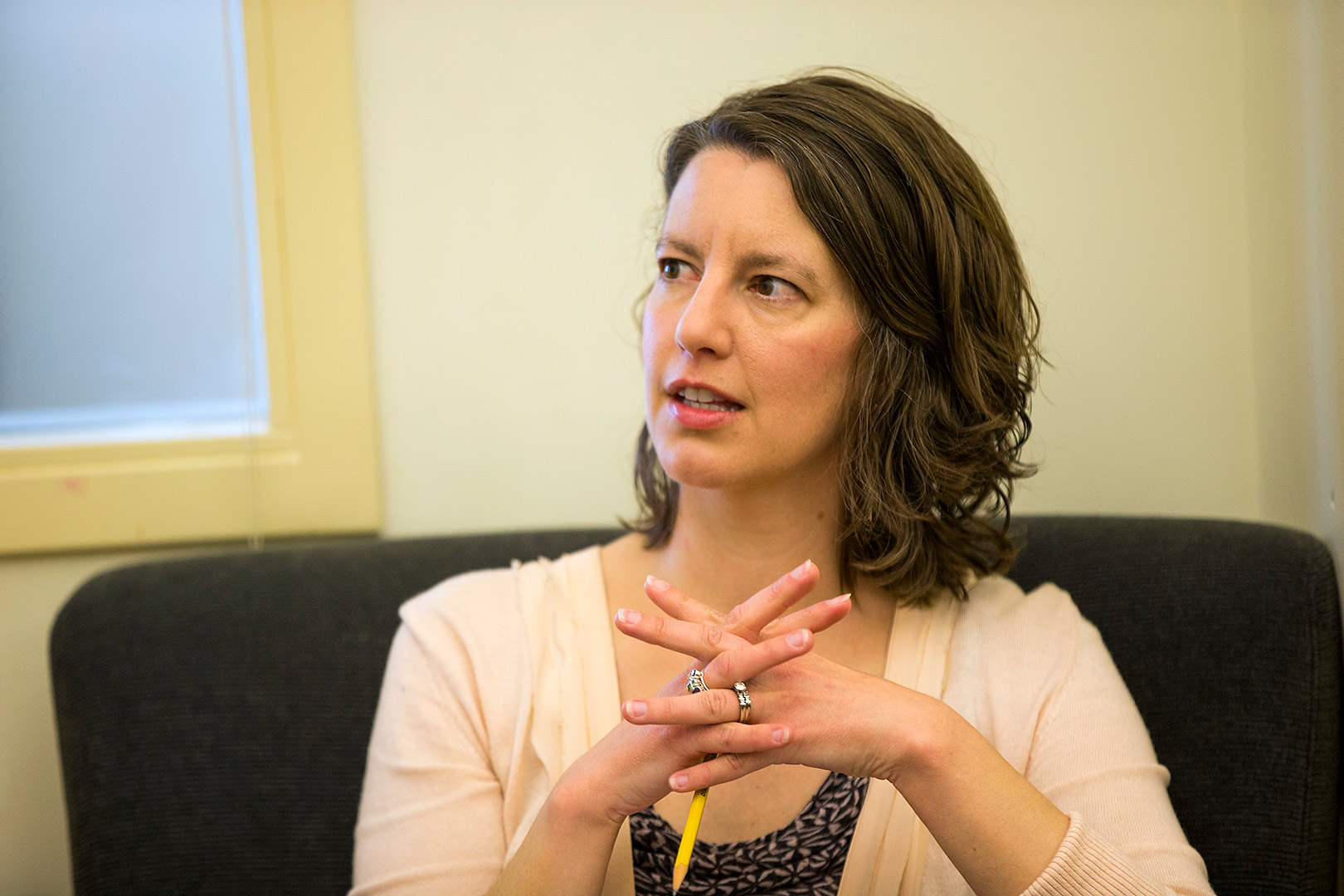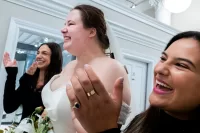
Short Term, alive and kicking and ‘optimized for experimentation,’ begins April 21
The rumors of Short Term’s demise have been greatly exaggerated.
At a presidential event in Boston in March, President Clayton Spencer and guest Al Filreis P’16, the University of Pennsylvania author and professor who teaches one of the most popular MOOCs anywhere, were taking questions from the audience.
When an alumna asked if a MOOC could work at Bates, Spencer took a moment to tout Bates’ strong culture of teaching innovation; at the same time, she put to rest rumors that the days of Short Term, which begins Monday, are numbered.
President Spencer talks about Short Term:
Maybe because it sticks out like a green thumb at the end of the Bates academic calendar, Short Term often seems ripe for review. Is it good enough? Can it be better?
And with a new president on board since 2012, folks have been curious about Spencer’s take on Short Term, the five-week, one-course spring experience beloved by Bates students since the mid-1960s.
As Spencer said in Boston, getting a big laugh, students are “flippin’ out that we’re going to eliminate Short Term.”
The answer, she said, is that “we’re not.”
The Boston faithful applauded, but the vote of confidence was qualified. “My feeling is that we have to optimize Short Term as a site for experimentation,” she said.
In that spirit, Bates is deploying two pilot programs this spring that play to Short Term’s founding tradition of innovation. And while the new programs might have the immediate effect of improving Short Term, they have a much larger purpose: Each supports the college’s primary strategic initiatives now being funded by the $11.5 million Catalyst Fund.
The three Bates initiatives:
+The Engaged Liberal Arts: Deep and sustained interactions
The “engaged liberal arts” means delivering a rigorous and highly personalized education that centers on deep and sustained interactions among students, faculty, and community. It also means engaging the forces — intellectual trends, demographic changes, and technology — that are transforming higher education and the world into which our students graduate. It means making a virtue of our scale; creating a diverse and motivated community of students, faculty, and staff; and embracing innovative and evidence-based approaches to teaching and learning.
+Purposeful Work: The heart of the liberal arts mission
Purposeful work is a college-wide initiative built on the premise that preparing students for lives of meaningful work lies at the heart of the liberal arts mission. When fully developed it will include: (1) a co-curricular program involving cycles of exploration, reflection, and skill-building; (2) practitioner-taught courses during short term, and (3) a highly-structured Bates-specific network of internships, with the hope to guarantee every Bates student a paid internship that is either employer- or Bates-sponsored.
+Opportunity and Excellence: Directly out of Bates’ history and mission
A commitment to opportunity and excellence grows directly out of Bates’ history and mission and responds to contemporary geographic, demographic, and economic realities. It means recruiting talented and motivated students from a broad range of backgrounds, providing them with the financial aid that will enable them to enroll, and supporting them for academic and personal success once here. It also means creating a campus community and climate that capitalize on diversity and inclusion as necessary and powerful dimensions of preparing our students to live and work in an increasingly interconnected world.
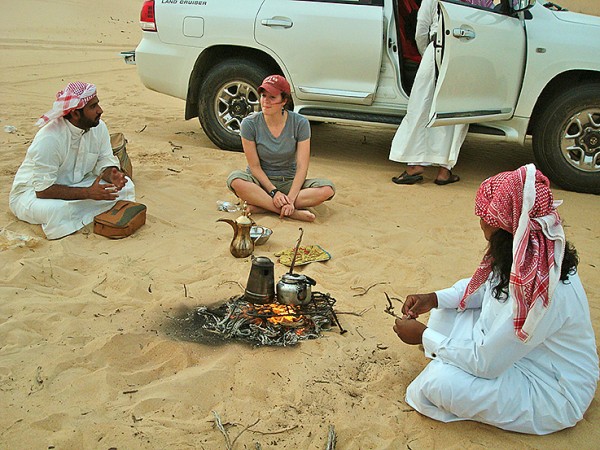
This spring’s first pilot program, falling under the Purposeful Work umbrella, is a series of practitioner-taught courses that will give students fundamental understanding in four professional fields:
- Shannon Banks ’85, a senior vice president at Martin’s Point Healthcare in Portland, will teach a course on healthcare administration.
- Brandy Gibbs-Riley ’96, a graphic designer who has created branding and marketing campaigns for high-profile corporate and nonprofit clients, will teach graphic design.
- Ben Schippers ’04 and Will Schenk, co-founders of the Brooklyn-based software development shop HappyFunCorp, will teach a course on digital innovation.
- Craig Saddlemire ’05, a documentary filmmaker and former Lewiston city councilor, will teach social-change organizing and advocacy with Sarah Standiford ’97 of Planned Parenthood and Aditi Vaidya ’00 of the social-justice focused Solidago Foundation.
The second pilot program falls more under the Engaged Liberal Arts realm, and it features small groups of students — just a half-dozen or so — working with a professor to either redesign one of the professor’s own regular-semester courses or create a whole new course for next year.
“Students will have an amazing intellectual and conceptual experience.”
Known as “Pedagogical Innovation and Course (Re)Design,” the course-redesign projects promise to give faculty the necessary “time and space for the creative work of pedagogical innovation,” says sociology professor Emily Kane, who is spearheading the project.
For students, they promise intense and intimate engagement with faculty. “The students will have an amazing intellectual and conceptual experience,” said Spencer in Boston.
Five projects will get underway on Monday:
- Stephanie Kelley-Romano (rhetoric) and her students will redesign her course on presidential campaign rhetoric. The course typically includes a mock campaign, and she wants to create “policy modules” that will involve students from fields like politics or economics in the campaign experience.
- Jason Castro (psychology) and his students will build a new course in computational neuroscience so students can apply techniques from engineering and computer science to address fundamental questions of brain function.
- Mara Tieken (education) and her students will create a new course that does more than teach students about community organizing.The course will teach students how to organize, instilling a valuable set of skills, techniques and orientations.
- Dennis Browne (Russian) and his students will redesign the college’s intermediate and advanced Russian language courses. Their goal will be to create multi-level classes in which traditional pedagogical texts are replaced by authentic audio and visual materials.
- Amy Douglass (psychology) and her students will explore new ways to teach statistics — a challenging, math-intensive course — by drawing on real-world data and active learning strategies. Ultimately, information learned during Short Term might inform discussions about how Bates teaches quantitative reasoning across the disciplines.
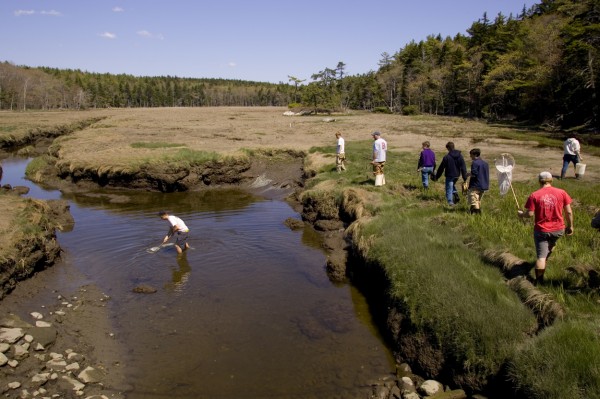
These new courses go along with all the regular Short Term courses, on and off campus.
This year, the suite of off-campus programs will see faculty and students studying human rights and art in Nogales, Mexico; Shakespeare in London; environment and culture in Russia; ecology and evolutionary biology in the Galapagos; culture within a European context in Berlin, German; and geology by kayak along the Maine coast.
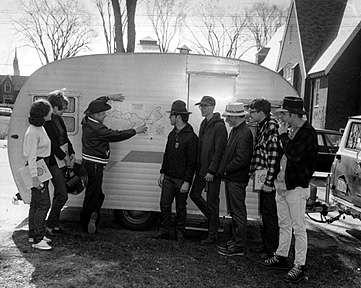
Whatever the era, one impulse to improve Short Term comes from an awareness on campus that students and faculty “pay” for those five weeks by having to pack a lot of teaching and learning into the rest of the academic year.
The winter term, especially, can feel hurried, an idea expressed by Professor of History Michael Jones a few years ago.
“Any Short Term course ought to be really good because intellectually they cost a lot.”

